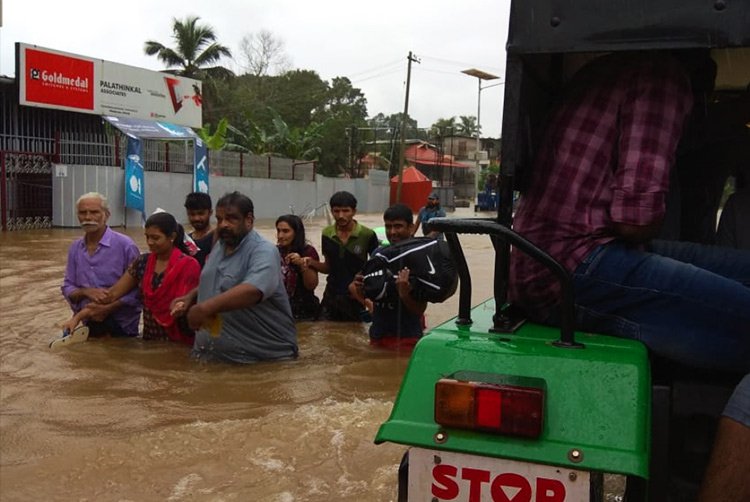
KERALA – There is one emotion common to anyone caught in a major flood. Fear. It is a fear that comes, like the water, in waves.
The first wave of fear begins with the initial awareness that a flood is possible. This fear is allayed by the hope that “Maybe it won’t affect me.”
The second wave comes as water begins to cover the ground and the skies are still pouring down rain. “Maybe it will affect me.”
The third wave may come as we realize that the waters are rising, and there is no way to stop them or contain them. “Maybe I should leave before it’s too late.”
The decision made at the point will determine the waves that follow. Remaining in place generates its own fears. Attempting to escape the onslaught of rushing water produces its own waves of fears based on rapidly changing and uncontrollable circumstances.
“Where shall I go and how shall I get there?” Often it is not possible to reach the destination initially thought achievable. Obstacles including snakes and both floating and hidden debris make the journey more difficult than imagined – and, all too often, impossible.
Fears continue to mount in wave after wave until fear evolves into despair that all is lost. The despair of being alone while surrounded by increasing danger may be the worst fear of all.
Missions Box received a report this week from the director of a Gospel for Asia (GFA)-supported medical ministry in Asia telling how he and others determined to put themselves into harm’s way to help rescue those who were trapped by the flooding and its companion of fear.
He saw 100 people crammed into a house that did not appear large enough to hold 10. “Everything was covered in water; we didn’t know where the river was, which way the road was. Everything was covered.”
Forced to suspend rescue efforts at nightfall, he sought refuge on a rooftop where he began to question how he and his friends would find food. Soon, he began to think, “If the rain doesn’t stop, how am I going to get out of this place?” as his fears became the same as those he had set out to rescue.
The more people he encountered, the more he observed that fear that permeated the population. It was difficult to determine if their trembling was a result of being drenched by the waters or being terrified by them. What can you do for these people? What can you say?
The answer came when he saw one woman hugged another who had just been rescued. The latter broke down, crying.
“Sometimes, you don’t need to say much. Your presence sometimes is enough. That, I think, is the main thing: just being there.”
How transforming it would be if we all came to that same understanding – the understanding that people everywhere want to know that they are not alone, that someone cares. Being devoid of that is at the root of almost all of our fears.
As followers of Jesus, we must remind ourselves of people’s inherent fear of being alone or lost. If people are not afraid of the present, they fear the future. The message of God’s love and care for us throughout the Bible is continually “Fear not” or some variation thereof.
When Moses met with the Lord as recorded in Genesis 33 to learn how to prepare and lead the children of Israel into the Promised Land, he realized the enormity of the task. What God was calling him to do was formidable. That is, it was downright scary. So, Moses asked for one thing. He asked for God to be present with him at all times. Which is exactly what the Lord did. And Moses found peace by promising to never go anywhere without the Lord’s presence.
Jesus came to seek and to save those who are lost, who are afraid of the present and the future, those who can find no hope. The Lord has called us to be like Jesus. Think how different life would be if we would care for others, not just caring for their immediate needs, but just being there, being present so they know they are not alone. So that our presence would reflect the love of Jesus and provide the same calm assurance that comes from His Presence.
“Your presence . . . sometimes is enough.”
Sources: Gospel for Asia, Firsthand Reflections of Flooding in Kerala, India
Image Source: Gospel for Asia, Compassion Services




